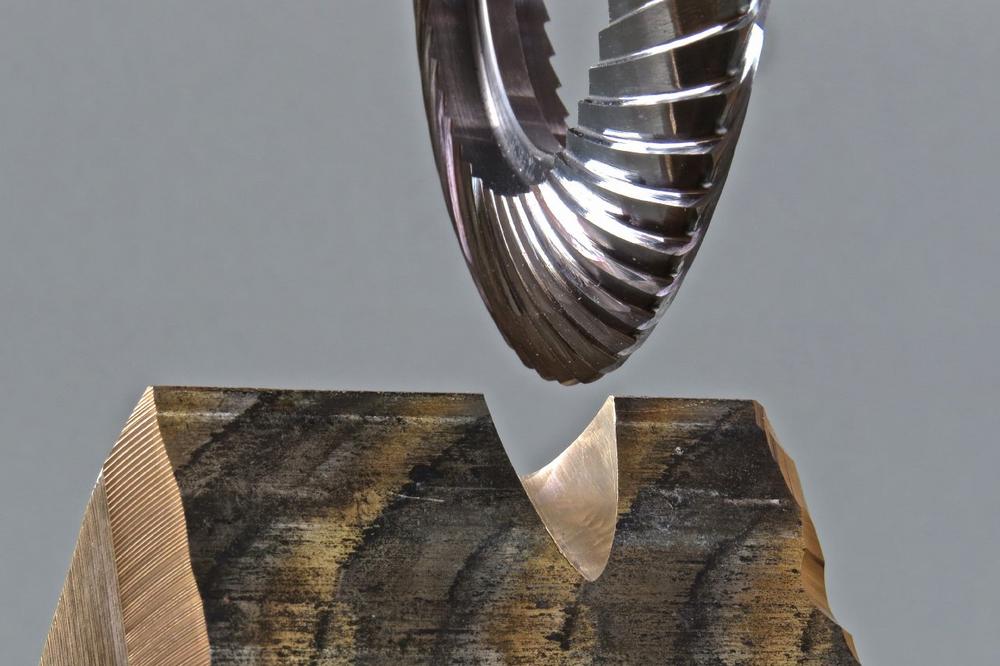To solve this problem, the idea arose to use the hand angle grinder, which has been known for about 70 years, to mill either electrically or pneumatically by hand. By that time, milling was only possible with stationary CNC machines or rotary cutters.
Starting in 1995, the tooth geometries for aluminum construction have been developed in a series of prototypes and user tests in various industries. In 2000, the milling discs finally were patented, and have been continuously developed since then. This also includes adaptions of the teeth geometries for various other materials like steel, stainless steel and titanium, depending on the different cutting speeds.
The discs are made of carbide, and have been developed as single and double-sided versions. While the single-sided milling disc is used for chamfering, deburring and removing weld seams, the double-sided milling disc is used to open and prepare weld seams. In 2019 the development of a new version of double-sided milling which can be used for both, chamfering and weld seam opening, discs has been finished.
Due to the combination of the two variants the need to frequently change tools when different work has to be carried out becomes unnecessary.
Both, the single and double sided milling discs are available in the default sizes from 70 mm to 150 mm. In addition, there are pneumatic tools developed for the use with the milling discs, using optimized rotation speeds and torques for the different materials and disc sizes. By the end of 2022 the product range will be expanded to 180 mm and 230 mm.
The milling discs have been developed with different toothing for every diameter and kind of disc. They range from coarse, for faster removal, to fine, with less removal, but a smoother surface. The specific toothing varies for the different materials. If needed, additional toothings and shapes are developed, to adjust them for specific work cases, materials or customer requirements.
The milling is characterized by:
- chips (completely harmless) instead of dust
- due to the special teeth geometry chips can be touched without gloves
- hardly / no sparks
- 40-60°C temperature in the material
- no structural change in the material due to heat
- no material discoloration
- metallic bright (no cavities while welding)
- no release of respirable particles in stainless steel processing (chrome / nickel)
- 40% reduction of noise
- the removed material is completely recyclable
- the carbide disc is completely recyclable too
A view on health, economy and ecology:
Health
- no dust – no release of respirable particles that are injurious to health like chrome / nickel
- no formation of flammable dust/air mixture
- significant more concentrated work possible – decreased sources of danger like heat or flying sparks when working with milling discs
- little effort for the user – the milling disc takes over the machining process – only little pressure is required
- less vibrations (white finger disease / VWF, vascular spasm)
- lower noise emissions
- protection of the direct environment
Economy
- little storage space required for the milling discs – thanks to service lives of up to 300 hours (depending on the material)
- efficiency: depending on the material, 40-70% faster removal rate than with grinding wheels
- processing in closed rooms – low fire protection effort for the user and the environment (e.g. warehouse goods)
- less machine wear – because no dust gets into the machine
Ecology
- the removed material is completely recyclable
- avoidance of waste – thanks to carbide milling discs that can be regrinded up to seven times
- complete recycling of the carbide if it can no longer be regrinded
The experience of the past 20 years (more than 4000 units sold) shows that working with the hand milling cutter represents a significant physical relief, especially for women.
The location-independent usage on structures weighting tons, e.g. turbine construction, brings a number of advantages. This includes cost and time reduction due to an omitted, logistical complex transport of the structure to the processing location.
Furthermore, already painted finished parts in the direct environment get preserved, as the chip contains neither high energy nor temperature.
The development of milling discs and machines according customer-specific requirements is also implemented within the scope of the technical possibilities.
Maija-Frästechnik GmbH, founded in 2012, develops, produces and sells high-quality milling tools made of hard metal. The company owns the patent for milling discs, which was registered in 2000 by the later company founder.
Today it supplies the metalworking industry worldwide in a wide variety of sectors, including ship and yacht construction, container construction, commercial vehicle construction, rail vehicle construction and foundries.
The milling discs were awarded with the German prize for resource efficiency in 2015 – the Federal Ministry of Economics and Technology honored Maija-Frästechnik GmbH for the efficient use of limited resources in 2015.
Ministry and experts were convinced about the recyclability of the milling chips, which – in contrast to abrasive dust – can be reused without major effort.
Maija Frästechnik GmbH
Kölner Straße 199
58256 Ennepetal
Telefon: +49 (2333) 86977-05
Telefax: +49 (2333) 86170-62
http://www.maija-fraestechnik.de/
CEO
Telefon: +49 (0)2333 869 77 05
Fax: +49 (0)2333 861 70 62
E-Mail: m.haertel@maija-fraestechnik.de
![]()
